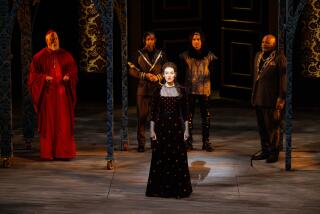THEATER REVIEW : Old Globe’s ‘Jeeves’ Makes ‘Pip Pip’ Wodehouse Primer
- Share via
SAN DIEGO — Some people say that impending nuclear war is the issue of the 20th Century. For P. G. Wodehouse, who wrote from 1901 until his death at age 93 in 1975, the real issues are:
- Will Bertram Wooster’s aunt really deny him the food of her chef, Anatole, (“God’s gift to gastronomic juices”) if Bertie refuses to tap dance and sing “Sonny Boy” in public?
- Will Bertie succeed in keeping his favorite checked suit over the objections of Jeeves, his valet, who quit his last employer when that gentleman dared to wear a flannel shirt to the dinner table?
“Jeeves Takes Charge,” conceived and adapted by actor Edward Duke from Wodehouse’s writings, is true to the timeless spirit of the comic master. The very convolutions required to turn the show into a 14-character, one-man enterprise at the Old Globe Theatre parallels the kind of challenges Wodehouse posed in weaving his intricate plots. Doing the show in the round at the Cassius Carter Centre Stage brings it even closer to the theatrical edge.
For the first time since Duke penned the show in 1975, he has handed the performing torch to another--San Diego comic actor Don Sparks--under Duke’s direction. It’s a plummy set of roles. And doesn’t Sparks know it!
Sparks enters as Bertie Wooster, a gloriously average wide-eyed gentleman of 24, fighting to maintain his red waistcoat and his even more questionable fiancee from the withering disapproval of Jeeves, who, of course, always knows best.
In a flash, Sparks becomes Jeeves himself, suddenly taller, with his ramrod straight back, narrowed eyes and sonorous, authoritative voice. When Jeeves says, “Employers are like horses; they need managing,” no doubt remains as to who is steering this ship of fools.
If Jeeves is the brains of the operation, poor, benighted Bertie, the Charlie Brown of the aristocratic set, is its heart. Jeeves’ cleverness dominates and ends the first act, while Bernie’s sweet haplessness takes over the second.
Charming as the individual segments of this confection are, the whole would be markedly improved if both forces had been more artfully blended in each half of the show’s script.
But no more could be asked from Sparks, who moves smoothly, fluidly and, yes, hilariously, from valet to master to doughty uncle to bossy fiancee to prancing 12-year-old schoolgirl to Bertie’s painfully shy school chum, Augustus Fink-Nottle, who moans that if only he and the woman he loves were newts (tadpoles), then he would know how to properly court her.
Cliff Faulkner’s set moves as fluidly as Sparks himself. A central circular piece becomes a seat, a bed, even a car with headlights. Wendy Heffner’s lighting and Lucy Peckham’s sound ease the action from inside to outside nicely, adding a few chirping birds here and dappling the light in the garden there. Stage hands, dressed in costumes Jeeves of which would have approved, did the set-changing work with such amusing silent-movie speed, they won a round of applause all by themselves.
“Jeeves Takes Charge” is, to use one of Bertie’s favorite expressions, a “pip pip” introduction to Wodehouse’s work. But those who know the body of work may find it a titillating appetizer that leaves one wanting more.
In a world infested by sequel-mania, would it be too much to ask for “Jeeves Part II”?
“JEEVES TAKES CHARGE”
Conceived and adapted by Edward Duke from the writings of P. G. Wodehouse. Director is Edward Duke. With Don Sparks. Sets by Cliff Faulkner. Costumes coordinated by Rosemary E. Bengele. Lighting by Wendy Heffner. Sound by Lucy Peckham. Stage manager is Maria Carrera. At 8 p.m. Tuesdays through Saturdays and 7 p.m. Sundays with Saturday-Sunday matinees at 2. Through Sept. 25. At the Cassius Carter Centre Stage, Simon Edison Centre, Balboa Park.
More to Read
The biggest entertainment stories
Get our big stories about Hollywood, film, television, music, arts, culture and more right in your inbox as soon as they publish.
You may occasionally receive promotional content from the Los Angeles Times.










